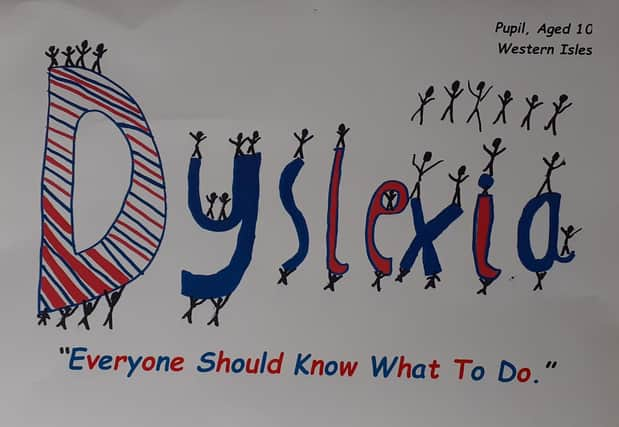‘Progress’ on addressing dyslexia in island schools


The Comhairle was responding to issues raised by a new campaign group, “A Dyslexia Life”, which highlighted exceptionally low figures for identified cases in the Western Isles, as listed in a National Statistics publication for the Scottish Government.
It suggested that, in 2020, no primary school children in the islands were identified with dyslexia while the number for secondary schools was still significantly fewer than in Orkney or Shetland. However, the Comhairle says that the primary school “blamk” quoted by National Statistics was “incorrect” and did not match other data.
Advertisement
Hide AdAdvertisement
Hide AdIn some cases, “the data is suppressed … due to low numbers potentially allowing individuals to be identified”. The Comhairle’s own data “shows a total of 102 pupils were recorded under the dyslexia classification in September 2020”.
The response continues: “The numbers of children in 2020 specifically identified with dyslexia may have been lower than other island authorities; however, many pupils were recorded by Comhairle schools under the broader definition of having specific learning difficulty in literacy and/or numeracy.”
“Since the publication of our own identification pathway guidance and, with increasing teacher familiarity and confidence with the process, we are now identifying more children as having dyslexia”
While noting “the error in the national statistics”, the Comhairle also recognised “the need to improve assessment and recording of dyslexia and (we) have been undertaking work to assist schools in doing so”.
Advertisement
Hide AdAdvertisement
Hide AdThe statement continues: “All primary and secondary schools follow our dyslexia guidance document and are advised to further refer to the Addressing Dyslexia Toolkit. This guidance has been followed and practised over the last four years and is due to be reviewed and updated by June 2023.
“This academic year, we have also prioritised dyslexia training for teachers, with significant numbers of staff in all schools participating”.
Although based in the Western Isles, “A Dyslexia Life” is a national campaign which wants to see the Scottish Parliament legislate to ensure dyslexia screening is mandatory in every primary school with every teacher trained in dyslexia.
Legislation with these aims is being promoted for England by Matt Hancock, the former Health Secretary and “A Dyslexic Life” want to see it replicated at Holyrood. They have been liaising with Mr Hancock’s office and the islands MP, Angus Brendan Macneil, has become a sponsor of his Bill.
Advertisement
Hide AdAdvertisement
Hide AdDonna Macleod, one of the founders of “A Dyslexic Life”, formed only in September, said they have received a great deal of interest from throughout Scotland. “We have had another very busy week” said Ms Macleod “and are getting support from all parties. We met Oliver Mundell MSP who was until recently the Conservative education spokesman at Holyrood, and he is very supportive of what we are trying to achieve”.
Ms Macleod said the importance of early identification of dyslexia could not be over-stated. “Otherwise it affects not only children’s achievements and educational progress but also their self esteem”. She pointed out that 50 per cent of prisoners in Scotland’s jails have dyslexia – and very few had the condition identified in childhood.